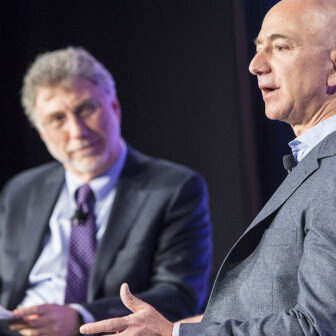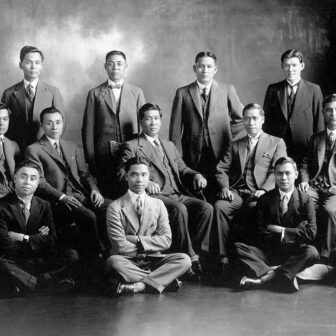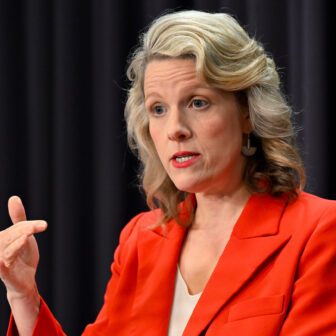The only thing the lawyers assembled in the Melbourne Magistrates’ Court last month knew for sure was that the air conditioning wasn’t working. “Is it getting warm in here?” magistrate Charlie Rozencwajg asked as the temperature in the snug courtroom continued to rise. “Feel free to take off your jackets.” None of the well-dressed barristers took up the offer: this prosecution was going to take them to the end of the year and they weren’t willing to show any loss of composure so soon.
It was the start of a court case set to revolutionise the way we see the conspiratorial price-fixing and bid-rigging known as “cartel” activity. For the first time in a hundred years, Australians could be jailed for illegal business agreements with competitors, a prospect likely to send a chill down the collective spine of local boardrooms.
This isn’t the first prosecution under Australia’s 2009 criminal cartel laws. Two Japanese shipping companies have already been convicted, with one of them still waiting to find out the size of the penalty. But it’s the first time that an Australian company has faced a prosecution and the first time individuals have been charged with offences carrying a maximum jail sentence of ten years.
That makes this court action against Mildura-based Country Care, a privately owned rehabilitation-aid retailer, and two individuals particularly significant. Any flaw in the tactics used by the Commonwealth Director of Public Prosecutions, or CDPP, and any shortcomings in the evidence gathered for the prosecutors by the Australian Competition and Consumer Commission will immediately cast a shadow over a far more dramatic prosecution set to explode in a Sydney court next year. Everyone in the courtroom knows that the unrelated criminal cartel allegations against ANZ, Deutsche Bank, Citigroup and six of the banking giants’ top managers is dominating the horizon. This is just the dress rehearsal.
Of course, civil cartel lawsuits in Australia are nothing new: the Visy–Amcor case of 2007, which culminated in a $36 million fine against Visy, got plenty of media coverage at the time. But a criminal cartel, carrying jail sentences and the risk of much tougher fines, takes us into uncharted waters. The last time we saw something like this unfold in an Australian court was in 1910: Billy Hughes was attorney-general in the second Fisher government and the criminal cartel prosecution failed so spectacularly that it would take a hundred years for legislators to regroup.
So here we are, in a stuffy courtroom in March 2019, with Country Care and two individuals each facing up to twenty-eight charges for capital-C cartel practices such as price-fixing and bid-rigging at the expense of government departments. According to court documents, these illicit agreements targeted the federal Department of Veterans’ Affairs and HealthShare NSW, a government agency. This may be a showcase prosecution, but for those on the receiving end, the stakes are high.
So far, the hearings have only scratched the surface of the allegations; the prosecution will start in earnest in the Federal Court of Australia in October. But what we already know is that federal prosecutors regard a meeting held in May 2014 at the St Kilda Novotel in Melbourne as the starting point of the alleged cartel. According to the charges, it was at this meeting of retailers from across eastern Australia that Country Care managing director Robert Hogan outlined an arrangement to fix prices on items for the elderly or the injured including beds, mattresses, wheelchairs, walkers, specialised furniture and continence products.
This, the prosecution has argued, was part of a bid-rigging arrangement in which the Mildura-based company would secure government contracts and bring in other members of the alleged cartel as subcontractors. Hogan is one of the two men facing charges; a former employee by the name of Cameron Harrison is the other.
The CDPP’s evidence against Country Care and Hogan includes slides presented at the Novotel meeting, one of which said: “Low prices on members’ websites — never advertise contracted products on websites for less than the contracted prices.” It was this message, prosecutors have alleged, that Country Care had been sending members of what is known as the Country Care Group, forty-three retailers selling assistive technology across regional centres in eastern Australia.
Why was the advertising of lower prices on members’ websites an issue? By keeping their prices offline, says the CDPP, members of the Country Care Group had been attempting to prevent government officials from discovering that the bids they were receiving as part of tender processes weren’t based on the lowest prices. This is where the price-fixing and bid-rigging allegations meet.
The CDPP has provided the court with a copy of a subcontracting agreement prepared by Country Care almost a year after the Novotel meeting. According to the allegedly anti-competitive agreement, drafted by an unnamed law firm, “The member must ensure that efforts to promote the products under the [Rehabilitation Appliances Program of the Department of Veterans’ Affairs, or DVA] contract do not lessen the market value of those items by advertising the products at a price less than the price agreed to by the DVA. This includes all online marketing.”
The CDPP might not have the recording of Hogan’s comments at the Novotel meeting, but it has the slides, the subsequent contract and a long list of witnesses who were in the room when the allegedly anti-competitive agreement was articulated. Prosecutors also allege that evidence unearthed by the ACCC points to a range of anti-competitive arrangements entered into from 2014 and 2015 — allegations corroborated in court by two witnesses with knowledge of two separate alleged offences. These key witnesses have one thing in common: they have been granted immunity to testify.
This is the point where the Country Care case is of intense interest to the Sydney lawyers already claiming billable hours to prepare defences for the ANZ, Citigroup and Deutsche Bank. Everyone wants to know whether the immunity deals offered to the two men in the Country Care case — deals signed off by the ACCC and embraced by the CDPP — will tarnish the witnesses’ credibility. Will the deals underpinning at least three of the four criminal cartel prosecutions in the pipeline stand up in court, or will a judge direct the jury to take the evidence provided by the “immunised” witnesses with a grain of salt?
Immunity deals are the stock-in-trade of prosecutors in cartel cases around the world. The logic is astoundingly simple: the first member of the cartel to report the other to authorities can avoid charges altogether and emerge from a sticky legal situation unscathed.
But why would two parties set up a profitable cartel only for one party to rat on the other? Usually, it’s because things change. A chief executive might resign. New board members might baulk at existing arrangements. New legal advisers might identify a cartel where others hadn’t. Or an honest company manager with a limited understanding of Australia’s Competition and Consumer Act may stumble into a friendly agreement with a small-town rival without having thought it through and decide to back out of the deal. These things happen.
What the introduction of criminal cartel offences did in 2009 was turbocharge the incentive for companies involved in illegal agreements to come forward. A company board may ultimately be able to write off a hefty fine as the price of doing business — but a jail term, with well-paid managers spending years in a cell, will put the fear of God into the most hardened cartel member. In New Zealand, where criminal cartel offences were voted into law this month, the main selling point was that while the laws may be used sparingly, the mere fear of winding up on the wrong end of a jail term would ferret out deals signed in the most inaccessible of smoky backrooms.
With criminal charges placing a greater burden on prosecutors to present conclusive evidence before the court, immunity agreements can also grant investigators access to documents, recordings and multimedia material that they may otherwise have missed. In the ANZ prosecution, a fourth bank is mentioned in court documents: J.P. Morgan. Unlike ANZ, Deutsche Bank and Citigroup, though, J.P. Morgan and its executives aren’t facing charges, inevitably leading to speculation that it has accepted an immunity deal. If that’s true, it could explain why the ACCC appears to have a recording of a conference call involving all four banks that is set to become a central piece of evidence in the case.
The Country Care prosecution also hinges on evidence provided by two beneficiaries of an immunity deal struck with the ACCC — a deal referred to, once immunity is finally accepted by the CDPP, as a “letter of comfort.” One of the “immunised” witnesses, Sydney businessman Andrew Cuddihy, appears to have knowledge of one of the bid-rigging allegations, although what evidence he will present when called to testify in the Federal Court remains unclear. What we already know is that the defence has documented Cuddihy’s often difficult relationship with ACCC investigators and his insistence that his request for immunity be dealt with quickly. Lawyers for the defence want to know how the decision to grant immunity was made. What was the quid pro quo? Can a witness be credible when he or she is bending over backwards to secure an immunity deal?
Then there’s the difficult question of how an immunity arrangement entered into by the investigator — in this case, the ACCC — can be transferred to the CDPP. The relationship between the antitrust regulator and Australia’s federal prosecutors is underpinned by an understanding that grants the CDPP full autonomy in deciding what cases to prosecute, when to prosecute them and whether to accept the ACCC’s immunity recommendations. But defence lawyers argue that the CDPP’s acceptance of an immunity deal at the outset, rather than after weighing up the pros and cons of the agreement during the trial itself, amounts to a departure from the prosecutor’s usual approach. This response to the CDPP’s role in dealing with cartels — a role it didn’t have before the 2009 criminal cartel laws were introduced — is also untested in a court of law.
Rightly or wrongly, those on the receiving end of Australia’s first criminal cartel charges will attempt to break the procedural nexus between the investigation and the immunity deals. If they are successful, both the public prosecutor and the ACCC may have to return to the drawing board and consider reviewing their reliance on immunities.
Late last month, halfway around the world from Charlie Rozencwajg’s courtroom, the ACCC’s top enforcement official, Marcus Bezzi, was in a contemplative mood. In what was billed as a “fireside chat” at a conference of American lawyers in Washington, DC, Bezzi acknowledged that his investigators’ use of immunity deals to pursue criminal cartel prosecutions wasn’t a “desirable state of affairs.” He would prefer more prosecutions to be “ex officio,” he said, with charges brought to the CDPP without the need for witnesses holding a get-out-of-jail card. Bezzi would have known then that the first of the three criminal cartel prosecutions expected to be announced this year, involving Vietnamese-Australian money-transfer companies, also appears to be centred around an immunity deal.
But Bezzi didn’t shy away from the historical significance of the new laws, giving the assembled lawyers a quick lesson on Australian history. Our first criminal cartel law, the 1906 Australian Industries Preservation Act, was based on the US Sherman Act of 1890, he said. As everyone in the room would have known, the Sherman Act was a keystone law outlawing monopolistic business practices carried out by American trusts. It may have been because of the Australian legislation’s American heritage that it ultimately failed when put to the test in London.
Under the Australian act, companies or individuals who repeatedly entered into arrangements that placed a “restraint of trade or commerce to the detriment of the public” would face a penalty “not exceeding 500 pounds” or a jail sentence “for any term not exceeding one year.” The offences were clearly defined but those were different times, and consumer rights weren’t front and centre of political considerations. This was, after all, a federation built around a belief in tariffs. Indeed, the main thrust of the Australian Industries Preservation Act was protectionist, with provisions designed to protect local industries from the impact of American capitalists searching for investments around the world — the trusts referred to in the word “antitrust.”
Australia’s early criminal cartel laws were put to the test just once. The Coal Vend case centred on a cartel agreement among coal and shipping companies, which was particularly nefarious given that no energy substitute for coal existed at the time. When the case went to the High Court in 1911 the charges against the companies were upheld. The decision was then overturned by a full sitting of the High Court in 1912, prompting the government to appeal the case in the Privy Council in London — at the time, Australia’s highest court of appeal.
“The British lords just felt that it was completely wrong for price-fixing to be banned,” Bezzi told his Washington audience. The lords just didn’t get it, he said — they thought that “this concept that you should prevent businesspeople from getting together and setting prices was totally wrong. You ought not allow a prohibition of such a nature.” The now thoroughly depoliticised belief that collusion among companies is both legally and morally wrong and that consumers should be protected from predatory behaviour didn’t resonate back then. The fact that the case had been pursued by a Labor attorney-general — Billy Hughes was still on that side of politics — may have added to the lords’ suspicion.
But, Bezzi joked, Australian regulators have had the last laugh against shipping cartels, with the successful prosecutions of shipping companies Nippon Yusen Kaisha (in 2016) and Kawasaki Kisen Kaisha (in 2018) marking the return of Australia’s criminal cartel offences. “We’ve had our revenge,” he said. •





